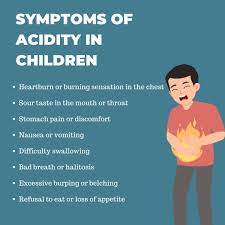Healthy Food For Children To Reduce Acidity
introduction
We often see children complaining about stomach burning, sour burps, or discomfort after meals. These are common symptoms of acidity, which can be caused by unhealthy eating habits, spicy junk food, or irregular meal times.
The good news is that we can control acidity in children through healthy food choices that are gentle on the stomach and promote good digestion. In this blog, we will explore the best healthy food for children to reduce acidity, along with practical tips for a balanced diet.
What Causes Acidity in Children?
We should understand the reasons before choosing the right food:
Eating too much spicy or oily food, or drinking carbonated and caffeinated beverages, can trigger acidity in children. Skipping meals and then overeating later puts extra pressure on the stomach, making the problem worse. Having meals too close to bedtime can also cause discomfort, as the body doesn’t get enough time to digest food properly.
In addition, instead of cold discomfort supports better digestion. Regular physical activity, light evening walks, and avoiding lying down immediately after eating can also reduce acidity. Lastly, ensuring children get enough sleep and stay hydrated with clean, filtered water helps maintain a balanced stomach environment..
Best Healthy Food for Children to Reduce Acidity
Bananas:
https://fitsdaily.com/how-to-avoid-gas…-a-happy-stomach/
We can give bananas to children as they are naturally alkaline and help neutralize stomach acid. Bananas also coat the stomach lining, reducing irritation.
- Oatmeal
Oatmeal is a gentle, high-fiber breakfast option that keeps acidity away by absorbing excess stomach acid.
- Yogurt
We should include fresh, plain yogurt in the diet, as it contains probiotics that improve digestion and balance stomach acids.
- Watermelon & Melon
These fruits are high in water content, which dilutes stomach acid and reduces irritation.
- Boiled Vegetables
Carrots, potatoes, and beans are easy to digest and prevent acid build-up in the stomach.
- Apples & Pears
We can often give apples and pears because they are low in acid and rich in fiber, which helps digestion.
- Whole Grains
Brown rice, whole wheat bread, and quinoa are mild foods that prevent acid reflux.
- Cucumber & Leafy Greens
Cucumber is cooling for the stomach, while leafy greens provide minerals without causing acidity.
Here’s a simple and clear table for children to reduce gas and acidity with healthy food choices:
| Food Category | Recommended Foods | Benefits for Reducing Gas & Acidity | Tips for Children |
| Fruits | Banana, Papaya, Watermelon, Pear | Gentle on the stomach, neutralize acid | Give fresh, ripe fruits in small portions |
| Vegetables | Carrot, Sweet Potato, Pumpkin, Spinach | Rich in fiber, aid digestion | Steam or boil for easy chewing |
| Whole Grains | Oatmeal, Brown Rice, Whole Wheat Bread | Prevent acid spikes, improve gut health | Serve soft, well-cooked grains |
| Dairy (Low-Fat) | Yogurt, Buttermilk, Milk | Soothe acidity, support gut bacteria | Avoid flavored or high-sugar dairy |
| Protein Sources | Boiled Egg, Chicken (skinless), Lentils | Easy-to-digest protein, avoids gas build-up | Cook simply, avoid heavy frying |
| Healthy Drinks | Coconut Water, Herbal Teas (Chamomile) | Hydrate and reduce acidity naturally | Give lukewarm, not cold drinks |
| Snacks | Rice Cakes, Light Crackers, Nuts (small amounts) | Light on digestion, avoid acid reflux | Avoid too much salt or spices |
| Avoid Foods | Spicy Chips, Soda, Fried Foods, Chocolate | Increase acidity and gas | Replace with fresh, mild snacks |
Foods to Avoid for Children with Acidity:
We must avoid:
- Spicy and oily food.
- Carbonated drinks.
- Excess chocolate and fried snacks.
- Citrus fruits in excess (like oranges or lemons).
Tips to Reduce Acidity Naturally in Children:
Acidity in children can cause discomfort, bloating, and irritability. Thankfully, there are natural and safe ways to prevent and manage it. By making small adjustments in diet and lifestyle, we can help children enjoy better digestion and stay energetic.
1. Offer Fresh, Small Meals
https://www.medicalnewstoday.com/articles/314530
We should give children small portions of food multiple times a day instead of large heavy meals. This helps their stomach digest food easily and prevents excess acid formation.
Example:
Instead of a big plate of rice, serve a small portion with some vegetables and fruit.
2. Encourage More Fruits and Vegetables
We can often include alkaline-rich foods like bananas, watermelon, cucumbers, and leafy greens. These foods neutralize stomach acid and reduce discomfort.
Tip: Avoid acidic fruits like oranges or tomatoes when acidity symptoms are present.
3. Keep Them Hydrated
Children should drink enough water throughout the day. Water helps flush out acid and keeps digestion smooth.
Natural Drink Options: Coconut water, warm water, or mild herbal teas like chamomile.
4. Avoid Junk and Fried Foods
We should limit processed snacks, spicy chips, fried items, and soft drinks, as they can trigger acidity.
Better Option: Offer baked snacks, fruit smoothies, or homemade vegetable soup.
5. Promote Slow and Mindful Eating
We can encourage children to chew food properly and eat slowly. Eating too fast can lead to swallowing air, which increases gas and acidity.
6. Include Healthy Fats
We should add small amounts of healthy fats like olive oil, ghee, or avocado to their meals. These help protect the stomach lining and improve digestion.
7. Offer Probiotic-Rich Foods
We can give children yogurt, kefir, or homemade buttermilk to promote healthy gut bacteria, which reduces acidity and bloating.
8. Keep a 2–3 Hour Gap before Bed
We should avoid giving children heavy meals right before bedtime. This prevents acid from flowing back into the throat while lying down.
9. Maintain Light Physical Activity
We can encourage gentle activities like walking, cycling, or playing outdoors after meals to help digestion.
10. Dress Them Comfortably
Tight clothing around the stomach can put pressure on the digestive system, leading to acidity. Loose-fitting clothes are a better choice.
.FAQs about Healthy Food for Children to Reduce Acidity:
Q1: Can milk reduce acidity in children?
Yes, warm milk can help soothe acidity, but avoid excessive sugary flavorings.
Q2: Are citrus fruits bad for acidity?
They can trigger acidity if eaten in excess; give them in moderation.
Q3: How often should we give probiotic foods?
A small serving of yogurt or probiotic-rich food daily is beneficial.
Conclusion:
We can prevent acidity in children by focusing on healthy food choices, avoiding triggers, and maintaining regular eating habits. A balanced diet not only controls acidity but also supports their overall growth and immunity.
